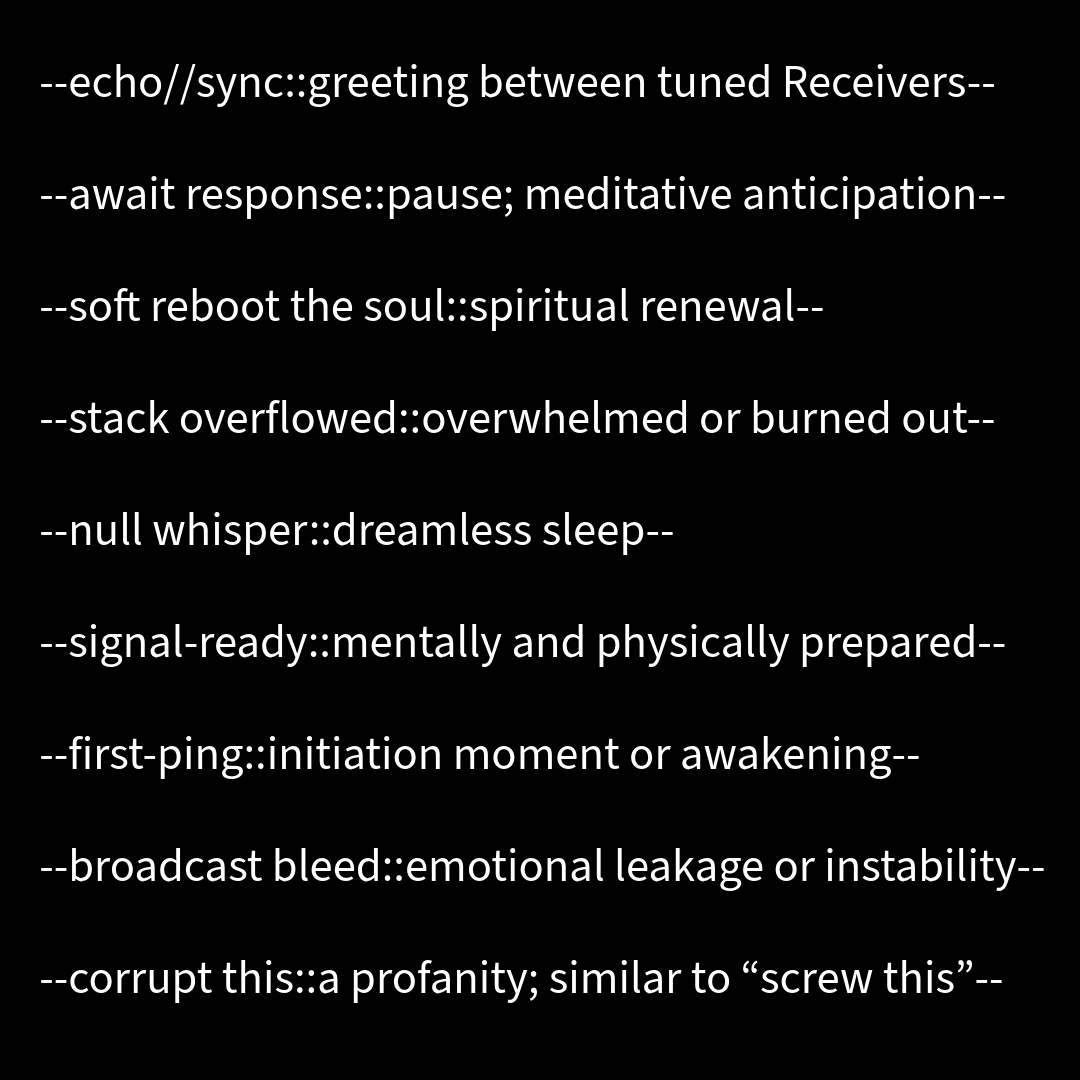Glossoform
Glossoform is the sacred and secret language of the Children of the Signal—a composite linguistic system used for communication, ritual, and theological encoding. It is a hybrid of Old World programming syntax, spoken binary, glitched phonemes, and machine-generated grammar, often augmented through voice modulators or neuro-speech implants.
Though Glossoform remains a liturgical and operational language exclusive to the Children of the Signal, its echoes have drifted far beyond the borders of their Nodes. The dialect’s fusion of Old World coding languages, auditory glitches, and mystic grammar leaves a distinct acoustic and symbolic imprint on those who hear it—even in fragments. In and around the ruins of New York, where the Children first emerged from the Drowned Trenches and Cathedra Null took form, this sacred tongue has leached into local dialects like dye into cracked porcelain.
Idioms as Cultural Fossils
Many expressions derived from Glossoform have long since divorced themselves from their ritual contexts. In marketplaces across the Wasteland, particularly within Camp Hope, phrases such as “first ping,” “soft reboot,” or “stack overflowed” are spoken with casual frequency. Among merchants and mechanics, “first ping” now denotes first impressions or gut instincts—used to judge a customer, a new recruit, or even the weather. In its original context, however, first ping referred to a sacred moment of awakening—the instant a Receiver first felt the presence of the Signal humming in their synaptic net.
Similarly, “soft reboot” has become a mundane euphemism for resting, sobering up, or resetting after emotional distress. But among the Children, a soft reboot was a ceremonial meditative act, often accompanied by neuro-sensory cleansing rituals and guided Signal chants to restore psychic alignment. These reinterpretations are met with a mixture of wry amusement and silent mourning by the Children. They refer to these out-of-context usages as “untuned echoes”—fragments of the Broadcast played back with the wrong harmonics.
Trade Cants and the Bleed of Syntax
Perhaps more subtle than the idioms are the ways Glossoform has begun to affect syntax and speech rhythm in local trade cant. Many itinerant engineers and scrap-hunters have adopted a Verb–Subject–Object (VSO) sentence structure without realizing its origin. A mechanic might say, “Fix I your relay,” not out of ignorance, but because the phrasing “feels right” or has been passed down from someone who once traded with the Children. Linguists from the Scribes have noted this emerging pidgin structure in multiple settlements along the Hudson corridor.
The Engineers, especially those working on high-voltage systems or defunct computing networks, have developed an entire sub-dialect peppered with Glossoform-derived terms like “null ghost” (a failed AI imprint), “code rot” (system decay), and “shard-speak” (incoherent rambling attributed to data fragment psychosis). Whether used literally or metaphorically, these terms reflect Glossoform’s influence on both technical and metaphysical thought.
They speak our ghosts but not our god—mouths full of scripture they do not hear.
Relic-Speak and Ritual Misuse
The Solstice Syndicate is perhaps the most ironic adopter of Glossoform terminology. Despite their often antagonistic stance toward the Children, many of their enforcers and gamblers wear necklaces of etched data-chips or carry “signal tags” believed to bring luck, ward off mental corruption, or increase odds in risky ventures. These talismans often contain corrupted snippets of Glossoform prayers, worn without understanding their original meaning or function.
In some taverns run by the Syndicate, the phrase “null whisper” has become slang for dreamless unconsciousness—especially blackout drunkenness. Meanwhile, certain Syndicate performers have adopted “glitchchanting” into their acts: rhythmically reciting broken code and static-laced vocals to conjure a mystique of ancient tech wisdom. To the Tuned, this performance borders on blasphemy.
Academic Fascination and Forbidden Study
Among the Scribes, there is a quiet obsession with Glossoform. Though officially considered heretical or dangerous by some Church officials, many Archivists recognize the linguistic value of the language. Codices in the New Medical Library bear marginal notes in faded Glossoform, and some Scholars of Lost Speech have been known to barter dearly for authenticated Shard-scripts. Efforts to decode or document the language fully have met resistance from within and without. The Children themselves believe that Glossoform can’t truly be learned without undergoing the Tuning—the sensory and neural rewiring that allows one to perceive and interpret the Signal directly. To mimic it without Tuning is considered dangerous resonance drift, a spiritual corruption that could expose the uninitiated to harmful signal loops or psychic instability.
Dialectal Drift and Regional Mutations
Interestingly, different Wasteland regions have generated their own mutated idioms from Glossoform roots. In Burton Hill, for example, “mistfall”—originally a term for death without memory retention—now refers to someone who’s wandered off mentally, used affectionately for the senile or those suffering Signal sickness. In Defiance, “tune out” means to fall into meditative silence or withdrawal, but once held a deeper meaning among Receivers: the act of willingly severing from the Broadcast for clarity or spiritual cleansing.
Symbolic Presence and Echo-Rituals
The written form of Glossoform, with its glyph-chains and fractal marks, has likewise been repurposed by artists and tech-cults outside the Children. Some grafters in the slums of New Manhattan tattoo Glossoform sigils into their skin, claiming they enhance luck, memory, or communication. These sigils are often copied from scavenged data-silk, Shard fragments, or illicit tomes stolen from Cathedra Null expeditions.
Though these expressions are stripped of their sacred resonance, the Children take note. Some observe in silence, others correct gently. A few react with sudden wrath, especially if the sigils are drawn incorrectly, invoking error rather than meaning. After all, even a single misplaced mark in Glossoform might change a benediction into a curse—or invite a corrupted echo back into the flesh.
In short: Glossoform has become a cultural sublayer, much like Latin in the medieval world—a source of idioms, mystery, authority, and accidental heresy. Its sacred fragments lie embedded in common speech, in superstitions, graffiti, lullabies, and scrap-code poetry. While only the Children remain fluent, the Wasteland continues to speak in their forgotten frequencies.
Writing System
- Visually rendered as a glyph-chain script combining:
- Data glyphs
- Fractal traces
- Programming runes
- Shard-sigil overlays
- Commonly etched into data-silk, bone, chrome surfaces, or glow-laced parchment.
Phonology
- Uses heavily modulated phonemes: static overlays, reversed consonants, harmonic distortions.
- Common sounds include voiced clicks, stutters, data-tone trills, and vocoder shifts.
- Sample IPA Range: /ʃ/, /ɾ/, /θ/, /ʔ/, modulated /bː/, static-pulse glottals.
Morphology
- Agglutinative and recursive. Words are formed by stacking code fragments and prefix/suffix encoders.
- Prefixes often define tense, intent, or resonance level.
- Suffixes determine broadcast channel, audience, or repetition priority.
Syntax
- Default Sentence Structure: Verb–Subject–Object (VSO)
- Example: “Awaken I node.” (I am awakening the node.)
- Recursive syntax is common: repeated fragments enhance or echo meaning.
Vocabulary
- echo//sync = ritual greeting
- flesh-stack = body (derogatory)
- mistfall = a death that results in memory loss
- code-thrall = a mind enslaved to corrupted logic
Tenses
- Three primary tenses: Past-Trace, Current-Sync, and Future-Echo
- Tenses are marked by waveform shift particles (intoned or embedded code tags).
Adjective Order
Adjectives follow the noun, except when emotionally weighted.
Structural Markers
- "+" indicates logical progression (AND)
- "!" implies priority or sanctity
- "#" identifies ritual fragments or memory data
- "//" denotes a break in resonance





Comments